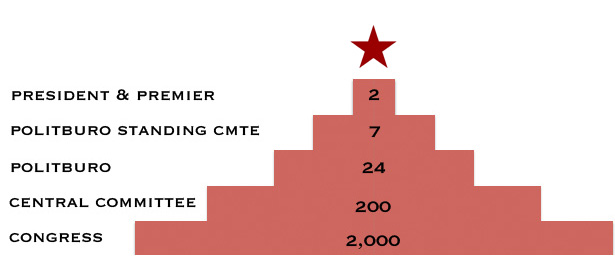18th National Congress of the CCP
President Obama just won the US election with over 300 Electoral College votes and a 1.7% advantage in the popular vote. Now, it’s China’s turn. Over the next few days, more than 2200 delegates of Chinese Communist Party (CCP) is gathering at its potentially epoch-changing 18th Congress to elect a new General Secretary, Premier of State, and members of the Politburo and Standing Committee, not to mention hammering out the country’s crucial development agenda for the next 5-10 years.
This is the first of a series of posts on the CCP Congress. First off, a brief introduction to the congress.
The CCP is the world’s largest political party with an estimated 82 million members. All political participation goes through the CCP with party members choosing delegates to the national congress. The CCP’s structure is pyramid-shaped from village members at the grassroots to the highest echelons of the Party apparatus and government in Beijing.
Since the mid-1980s, the CCP has tried to maintain a smooth and orderly succession and avoiding, in particular, the cult of personality that pervaded under Chairman Mao. The CCP national congress convenes every 5 years and chooses leading officials every 10 years. Delegates elect about 200 to 300 members to the CCP’s Central Committee along with 150 alternates.
The Central Committee, in turn, picks the Party’s highest decision-making body, the 24-25 member Politburo and its all-powerful Standing Committee which has consisted of 9 members since the last congress. This time round, the Standing Committee is expected to be whittled down to 7 members. The Politburo often includes party secretaries from municipalities and the largest provinces. Provincial and central ministry chiefs must retire at 65.
At this congress, 14 Politburo members are expected to step aside due to age and tenure limits, including 7 members of the Standing Committee, most notably, General Secretary Hu Jintao and Premier Wen Jiabao. Barring a catastrophe, they will be replaced by Messrs Xi Jinping and Li Keqiang respectively. Since 1993, the general secretary has also served as the president of state. (A subsequent post will provide brief introductions to the two leaders.)
The Politburo Standing Committee also appoints 4 vice-premiers of the State Council and the Chairman of the National People’s Congress (NPC), China’s nominal parliament. Its chairman, Mr Wu Bangguo will step down at this congress. The State Council’s main role is running and managing the national economy, overseeing central bureaucracies under its wing along with 35 leading members heading up government ministries. Members of the Chinese People’s Political Consultative Conference (CPPCC), China’s advisory body, can be CCP and non-CCP members but its Chairman is usually a Politburo member. Mr Jia Qinglin, current chairman, will retire.
As previously posted, aside from leadership changes, the Congress also reviews and rewrites, whenever necessary, parts of the Party’s Constitution. The 15th Congress in 1997, following the death of paramount leader Deng Xiaoping and the repatriation of the Hong Kong SAR that year, saw the departure of Qiao Shi, former Chairman of the NPC and the enshrining of Deng Xiaoping Theory in the constitution.
At the 16th Congress in 2002, the ‘Fourth Generation’ of CCP leaders under Hu Jintao assumed control of the Party/state with former General Secretary Jiang Zemin retaining the Chair of the Central Military Commission for a number of years as his ‘Three Represents’ theory became part of Party doctrine. At the last Congress in 2007, Vice-President Zeng Qinghong, a leading Jiang Zemin protégé, left the limelight and Hu Jintao’s ‘Scientific Development Concept’ became a canon in the CCP’s guiding ideology.
Compared to the CCP congressional process which is steeped in secrecy, the HKSAR has limited democracy that allows Hong Kongers to directly elect half of its 60 legislators with the head of government chosen by a special body of 1200 members. Hong Kong will be allowed to directly elect its leader in 2017 and all of its lawmakers by 2020 at the earliest. The Macau SAR shares similar processes.
Since the death of strongman Chiang Kai-shek’s son Chiang Ching-kuo in 1988, Taiwan has transformed into a full-fledged yet rowdy and rambunctious democracy with fist fights in parliament and attempted assassinations of election candidates. Former President Chen Shui-bian of the Democratic Progressive party that openly espouses independence from China, is currently serving a lengthy prison sentence for corruption.

